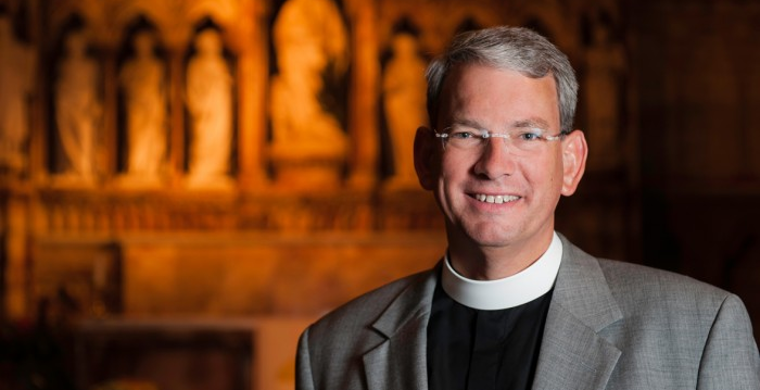SALT LAKE CITY, UT: Episcopal Convention Hears Diverging Tales of Troubled Seminary
By Jeff Walton
http://juicyecumenism.com/
June 29, 2015
Episcopalians gathered for their denomination's triennial General Convention in Salt Lake City are being met with sharply contrasting accounts of the state of the church's flagship seminary in New York City.
General Theological Seminary (GTS) Dean Kurt Dunkle has offered a glowing assessment of the historic seminary's programs and finances during a series of three informal meet-and-greet sessions with alumni and convention deputies. At the same time, Bishops have received a widely circulated letter from former students describing an institution in distress.
Conflict at the Episcopal Church's oldest seminary erupted into public view in Autumn of 2014 when eight of the school's ten full-time faculty members were effectively dismissed. Faculty authored a letter to the GTS Board of Trustees protesting a series of alleged abuses involving the dean. Most of the dismissed faculty later returned "provisionally" to work at the school for the remainder of the academic year.
Longtime Professor of Church Music David J. Hurd has announced his retirement, while Professor of Liturgy Patrick Malloy has accepted a position as Interim Dean of St. John's Cathedral in Denver. Professor of New Testament Deirdre Good announced her departure in April. According to The Living Church, half of the eight faculty members involved in the work dispute this past year will not be returning in the autumn.
Seminaries operate as independent institutions, but GTS has the distinction of being the only school educating Episcopal Church seminarians that was chartered by the denomination's General Convention. The church's legislative body also appoints six of the school's 35 trustees.
In an evening session at the Salt Lake City Hilton Hotel with about 30 alumni, students and trustees of the seminary, Dunkle offered ten-minute responses to a handful of questions about his vision for the school and his assessment of the damage done after a year of faculty uproar.
Dunkle was enthusiastic in touting the seminary's "Wisdom Year" program, in which seminarians are placed in parishes in the greater New York area to both learn and work. Noting that fewer and fewer Episcopal parishes were offering curacy positions to new graduates, Dunkle cited the Wisdom Year as a blend of education and spiritual formation that would both provide a modest income to students and benefit congregations within commuting distance of the seminary campus.
The school's financial situation was also addressed, with Dunkle praising property sales as not only retiring GTS debt, but also beautifying the campus with commercial real estate development that the seminary itself could not afford.
"The seminary has zero debt," Dunkle reported, referring to the on-campus hotel which was sold to a developer as a money-losing "white elephant" and the sale of a faculty office building and apartment complex as having minimal impact on the institution.
The hotel and conference center has since been redeveloped as The High Line Hotel, garnering enthusiastic words in the pages of Vanity Fair as "destined to become Manhattan's next buzzy event space."
Dunkle reported that the school was still chipping away at an operating deficit that was $3 million a year when he assumed leadership of the seminary. Brick work on the chapel remains covered in scaffolding and three years overdue, and a new heating system is needed.
Asked how he was doing following the turmoil of the recent academic year, Dunkle used the analogy of a rail line running between New York and Washington, D.C. as figuratively between grief and restoration. Dunkle described some people at General as on trains almost to D.C., while others "haven't left the Holland Tunnel."
"I'm in Baltimore" the GTS dean appraised.
Dunkle, who was recruited from the Episcopal Diocese of Florida to lead the seminary in 2013, noted that he did not hold a PhD but described himself as a turnaround artist: "I fix broken things."
The GTS dean said he understood that most people involved in the conflict did not act with malice, but changes at the seminary "put a wrinkle into the lives" of some faculty. Dunkle has also publicly discussed redefining what faculty tenure would involve.
In contrast to Dunkle's presentation, the letter by two former students in GTS' ThD program alleged that the seminary was "failing to provide basic structures of accountability for accusations of discrimination and harassment" and protested that "students are now understood to be consumers, bishops and dioceses customers."
Former first-year graduate students J. David Belcher and Shane R. Brinegar assessed the changes as having "disastrous effect."
The former GTS students wrote of a "staggering loss of staff," an "egregiously mismanaged" endowment and noted that the class of Fall 2014 "was reduced by 30 percent by mid-semester."
The two also took shots at Dunkle's business background, claiming the Dean and Board "treated our vocations as commodities to be bought and sold."
END














